Educational Philosophies: Progressivism and Behaviorism Examined
VerifiedAdded on 2023/01/09
|9
|2401
|59
Essay
AI Summary
This essay examines two contrasting philosophies of education: Progressivism and Behaviorism. It explores their core principles, emphasizing how Progressivism focuses on experiential learning and student-centered approaches, encouraging critical thinking and problem-solving skills through real-world experiences. In contrast, Behaviorism emphasizes the role of environmental factors and reinforcement in shaping student behavior and classroom management. The essay analyzes how these philosophies manifest in primary school and outdoor learning environments, highlighting their impact on teaching methodologies, curriculum design, and student outcomes. The discussion includes the strengths and weaknesses of each approach, considering their implications for fostering holistic student development and effective learning environments. The paper concludes by summarizing the contrasting impacts of both philosophies on the learning experience.
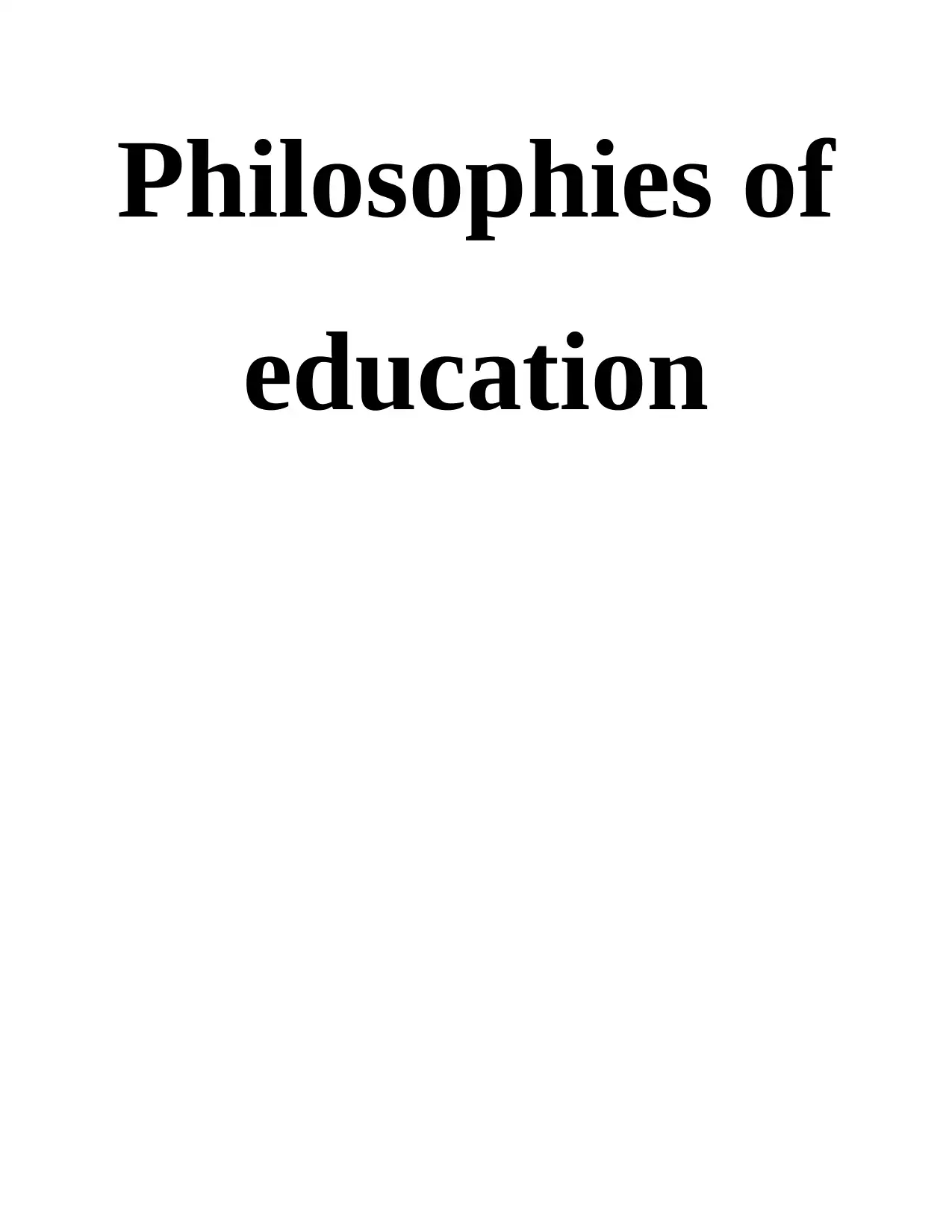
Philosophies of
education
education
Paraphrase This Document
Need a fresh take? Get an instant paraphrase of this document with our AI Paraphraser
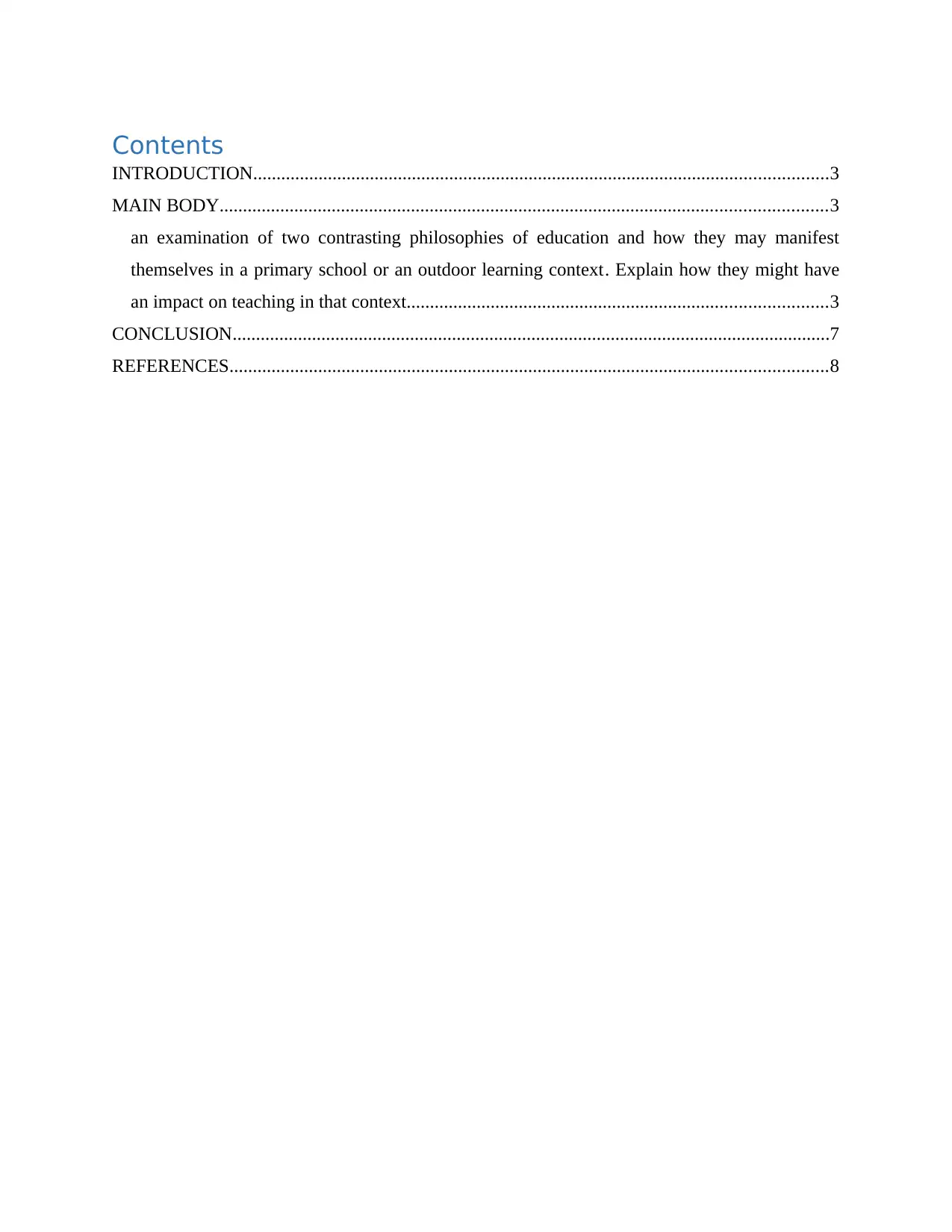
Contents
INTRODUCTION...........................................................................................................................3
MAIN BODY..................................................................................................................................3
an examination of two contrasting philosophies of education and how they may manifest
themselves in a primary school or an outdoor learning context. Explain how they might have
an impact on teaching in that context..........................................................................................3
CONCLUSION................................................................................................................................7
REFERENCES................................................................................................................................8
INTRODUCTION...........................................................................................................................3
MAIN BODY..................................................................................................................................3
an examination of two contrasting philosophies of education and how they may manifest
themselves in a primary school or an outdoor learning context. Explain how they might have
an impact on teaching in that context..........................................................................................3
CONCLUSION................................................................................................................................7
REFERENCES................................................................................................................................8
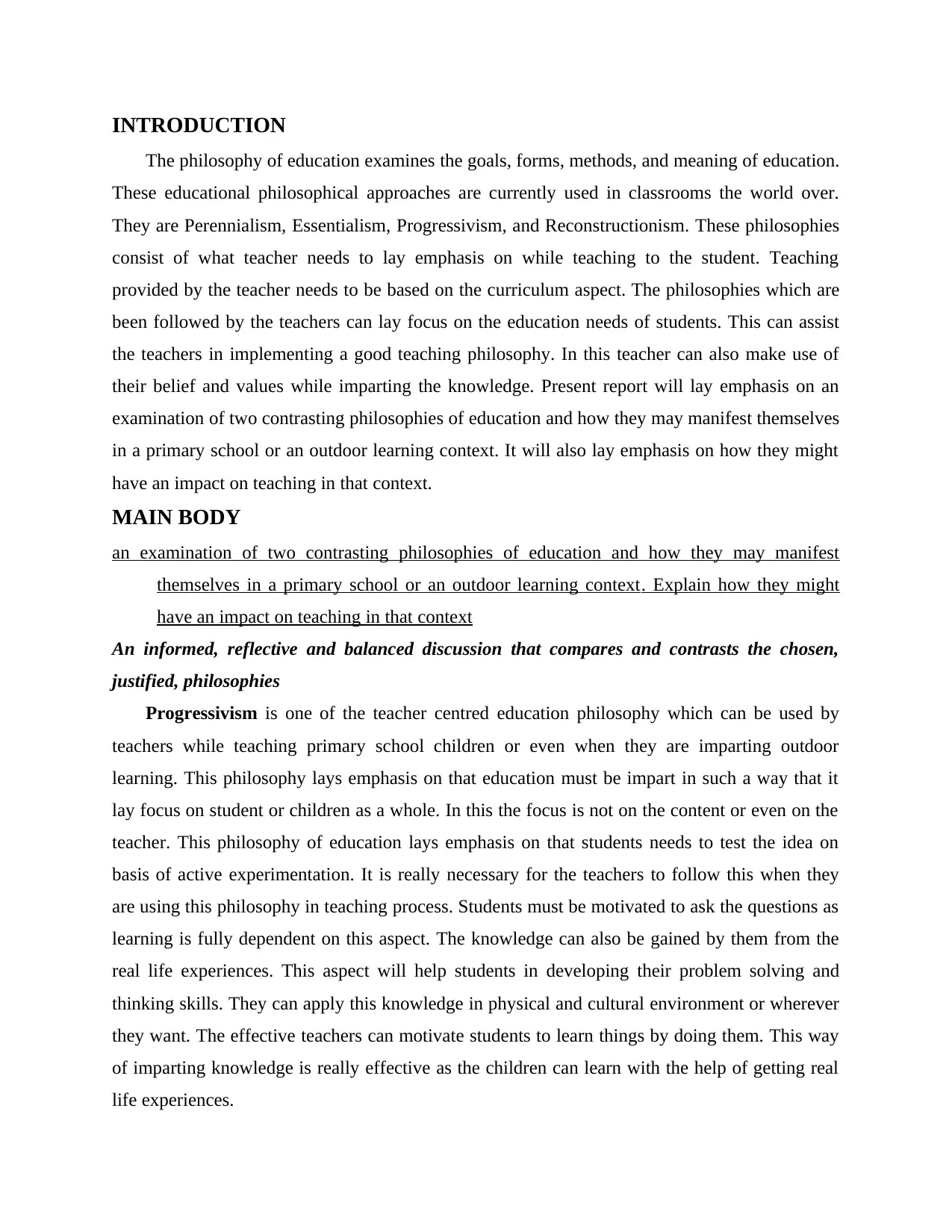
INTRODUCTION
The philosophy of education examines the goals, forms, methods, and meaning of education.
These educational philosophical approaches are currently used in classrooms the world over.
They are Perennialism, Essentialism, Progressivism, and Reconstructionism. These philosophies
consist of what teacher needs to lay emphasis on while teaching to the student. Teaching
provided by the teacher needs to be based on the curriculum aspect. The philosophies which are
been followed by the teachers can lay focus on the education needs of students. This can assist
the teachers in implementing a good teaching philosophy. In this teacher can also make use of
their belief and values while imparting the knowledge. Present report will lay emphasis on an
examination of two contrasting philosophies of education and how they may manifest themselves
in a primary school or an outdoor learning context. It will also lay emphasis on how they might
have an impact on teaching in that context.
MAIN BODY
an examination of two contrasting philosophies of education and how they may manifest
themselves in a primary school or an outdoor learning context. Explain how they might
have an impact on teaching in that context
An informed, reflective and balanced discussion that compares and contrasts the chosen,
justified, philosophies
Progressivism is one of the teacher centred education philosophy which can be used by
teachers while teaching primary school children or even when they are imparting outdoor
learning. This philosophy lays emphasis on that education must be impart in such a way that it
lay focus on student or children as a whole. In this the focus is not on the content or even on the
teacher. This philosophy of education lays emphasis on that students needs to test the idea on
basis of active experimentation. It is really necessary for the teachers to follow this when they
are using this philosophy in teaching process. Students must be motivated to ask the questions as
learning is fully dependent on this aspect. The knowledge can also be gained by them from the
real life experiences. This aspect will help students in developing their problem solving and
thinking skills. They can apply this knowledge in physical and cultural environment or wherever
they want. The effective teachers can motivate students to learn things by doing them. This way
of imparting knowledge is really effective as the children can learn with the help of getting real
life experiences.
The philosophy of education examines the goals, forms, methods, and meaning of education.
These educational philosophical approaches are currently used in classrooms the world over.
They are Perennialism, Essentialism, Progressivism, and Reconstructionism. These philosophies
consist of what teacher needs to lay emphasis on while teaching to the student. Teaching
provided by the teacher needs to be based on the curriculum aspect. The philosophies which are
been followed by the teachers can lay focus on the education needs of students. This can assist
the teachers in implementing a good teaching philosophy. In this teacher can also make use of
their belief and values while imparting the knowledge. Present report will lay emphasis on an
examination of two contrasting philosophies of education and how they may manifest themselves
in a primary school or an outdoor learning context. It will also lay emphasis on how they might
have an impact on teaching in that context.
MAIN BODY
an examination of two contrasting philosophies of education and how they may manifest
themselves in a primary school or an outdoor learning context. Explain how they might
have an impact on teaching in that context
An informed, reflective and balanced discussion that compares and contrasts the chosen,
justified, philosophies
Progressivism is one of the teacher centred education philosophy which can be used by
teachers while teaching primary school children or even when they are imparting outdoor
learning. This philosophy lays emphasis on that education must be impart in such a way that it
lay focus on student or children as a whole. In this the focus is not on the content or even on the
teacher. This philosophy of education lays emphasis on that students needs to test the idea on
basis of active experimentation. It is really necessary for the teachers to follow this when they
are using this philosophy in teaching process. Students must be motivated to ask the questions as
learning is fully dependent on this aspect. The knowledge can also be gained by them from the
real life experiences. This aspect will help students in developing their problem solving and
thinking skills. They can apply this knowledge in physical and cultural environment or wherever
they want. The effective teachers can motivate students to learn things by doing them. This way
of imparting knowledge is really effective as the children can learn with the help of getting real
life experiences.
⊘ This is a preview!⊘
Do you want full access?
Subscribe today to unlock all pages.

Trusted by 1+ million students worldwide
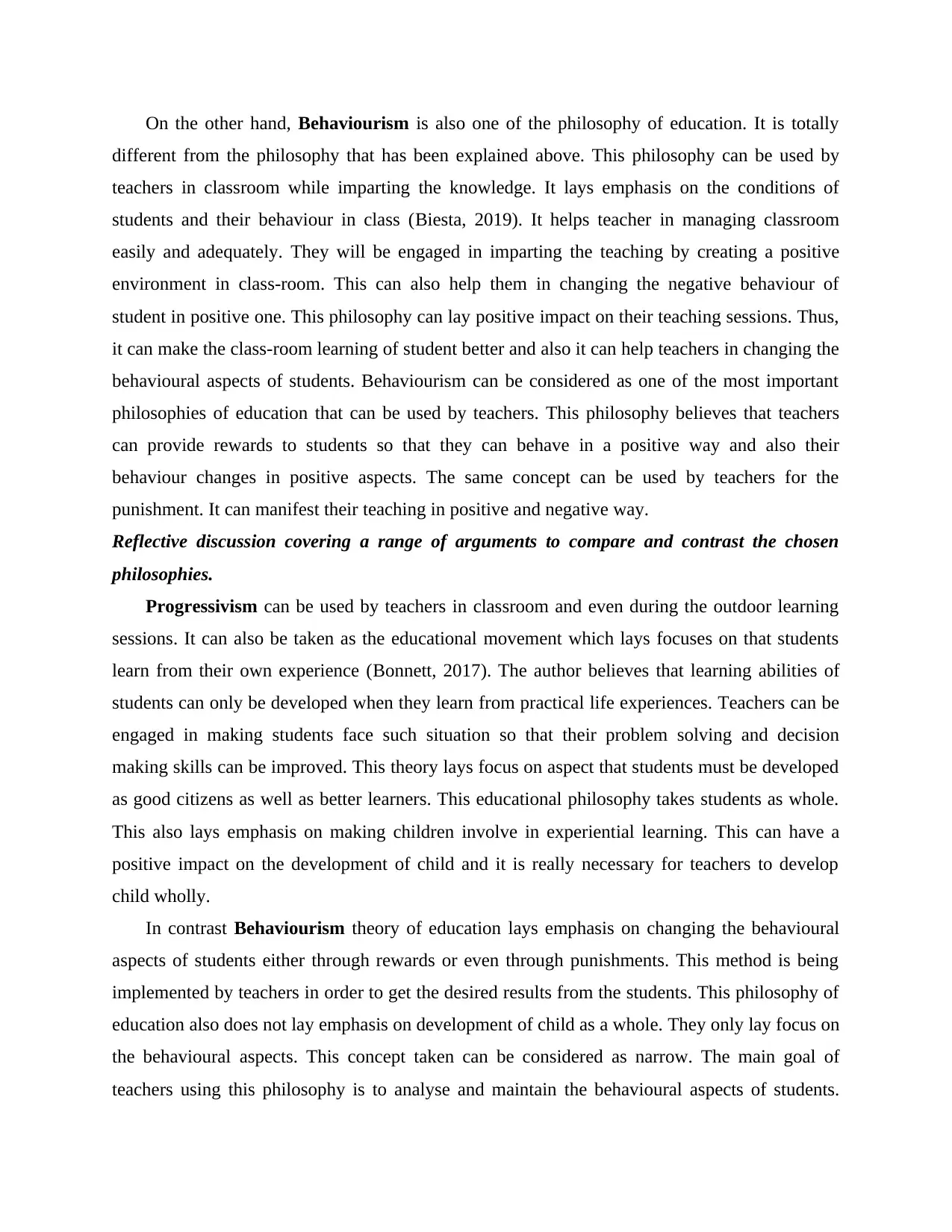
On the other hand, Behaviourism is also one of the philosophy of education. It is totally
different from the philosophy that has been explained above. This philosophy can be used by
teachers in classroom while imparting the knowledge. It lays emphasis on the conditions of
students and their behaviour in class (Biesta, 2019). It helps teacher in managing classroom
easily and adequately. They will be engaged in imparting the teaching by creating a positive
environment in class-room. This can also help them in changing the negative behaviour of
student in positive one. This philosophy can lay positive impact on their teaching sessions. Thus,
it can make the class-room learning of student better and also it can help teachers in changing the
behavioural aspects of students. Behaviourism can be considered as one of the most important
philosophies of education that can be used by teachers. This philosophy believes that teachers
can provide rewards to students so that they can behave in a positive way and also their
behaviour changes in positive aspects. The same concept can be used by teachers for the
punishment. It can manifest their teaching in positive and negative way.
Reflective discussion covering a range of arguments to compare and contrast the chosen
philosophies.
Progressivism can be used by teachers in classroom and even during the outdoor learning
sessions. It can also be taken as the educational movement which lays focuses on that students
learn from their own experience (Bonnett, 2017). The author believes that learning abilities of
students can only be developed when they learn from practical life experiences. Teachers can be
engaged in making students face such situation so that their problem solving and decision
making skills can be improved. This theory lays focus on aspect that students must be developed
as good citizens as well as better learners. This educational philosophy takes students as whole.
This also lays emphasis on making children involve in experiential learning. This can have a
positive impact on the development of child and it is really necessary for teachers to develop
child wholly.
In contrast Behaviourism theory of education lays emphasis on changing the behavioural
aspects of students either through rewards or even through punishments. This method is being
implemented by teachers in order to get the desired results from the students. This philosophy of
education also does not lay emphasis on development of child as a whole. They only lay focus on
the behavioural aspects. This concept taken can be considered as narrow. The main goal of
teachers using this philosophy is to analyse and maintain the behavioural aspects of students.
different from the philosophy that has been explained above. This philosophy can be used by
teachers in classroom while imparting the knowledge. It lays emphasis on the conditions of
students and their behaviour in class (Biesta, 2019). It helps teacher in managing classroom
easily and adequately. They will be engaged in imparting the teaching by creating a positive
environment in class-room. This can also help them in changing the negative behaviour of
student in positive one. This philosophy can lay positive impact on their teaching sessions. Thus,
it can make the class-room learning of student better and also it can help teachers in changing the
behavioural aspects of students. Behaviourism can be considered as one of the most important
philosophies of education that can be used by teachers. This philosophy believes that teachers
can provide rewards to students so that they can behave in a positive way and also their
behaviour changes in positive aspects. The same concept can be used by teachers for the
punishment. It can manifest their teaching in positive and negative way.
Reflective discussion covering a range of arguments to compare and contrast the chosen
philosophies.
Progressivism can be used by teachers in classroom and even during the outdoor learning
sessions. It can also be taken as the educational movement which lays focuses on that students
learn from their own experience (Bonnett, 2017). The author believes that learning abilities of
students can only be developed when they learn from practical life experiences. Teachers can be
engaged in making students face such situation so that their problem solving and decision
making skills can be improved. This theory lays focus on aspect that students must be developed
as good citizens as well as better learners. This educational philosophy takes students as whole.
This also lays emphasis on making children involve in experiential learning. This can have a
positive impact on the development of child and it is really necessary for teachers to develop
child wholly.
In contrast Behaviourism theory of education lays emphasis on changing the behavioural
aspects of students either through rewards or even through punishments. This method is being
implemented by teachers in order to get the desired results from the students. This philosophy of
education also does not lay emphasis on development of child as a whole. They only lay focus on
the behavioural aspects. This concept taken can be considered as narrow. The main goal of
teachers using this philosophy is to analyse and maintain the behavioural aspects of students.
Paraphrase This Document
Need a fresh take? Get an instant paraphrase of this document with our AI Paraphraser
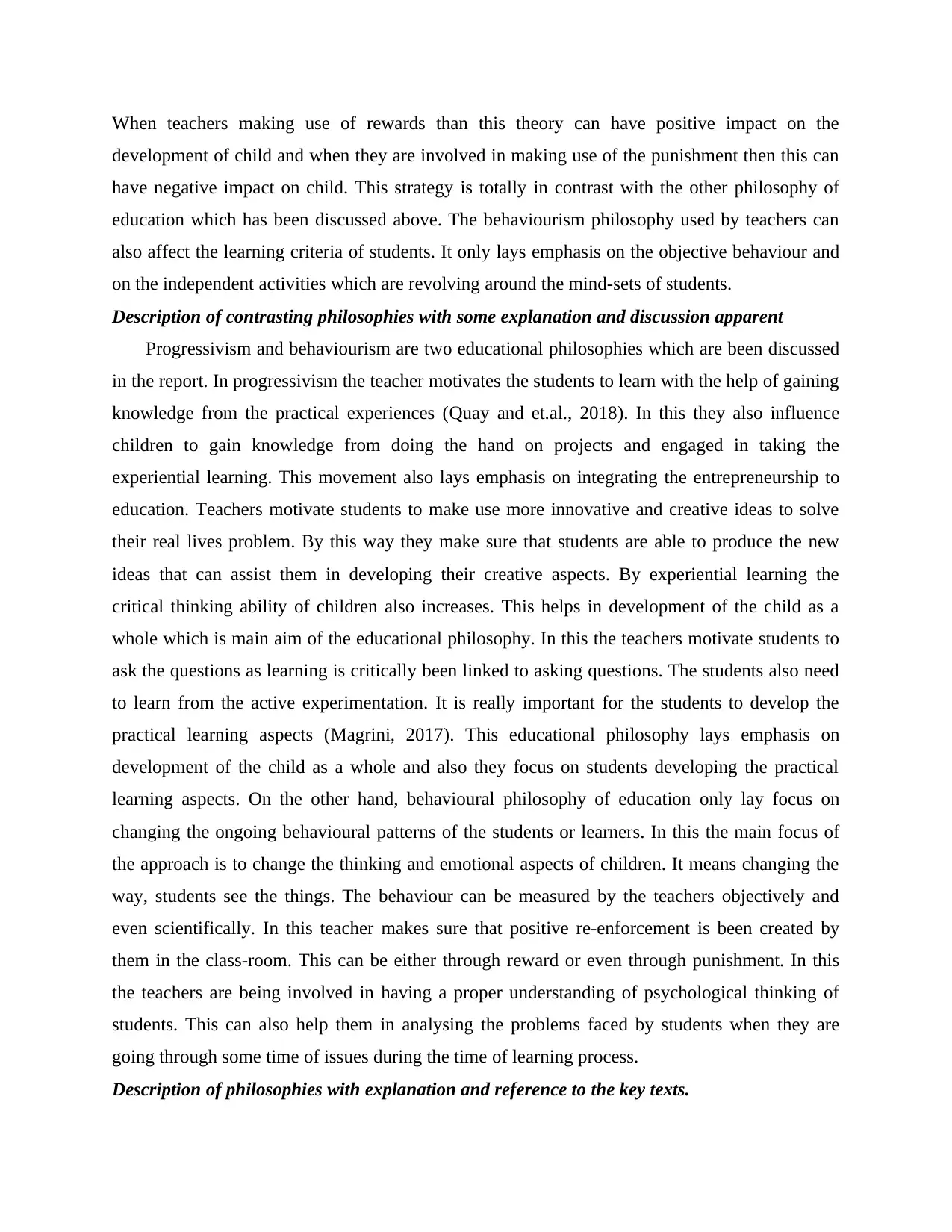
When teachers making use of rewards than this theory can have positive impact on the
development of child and when they are involved in making use of the punishment then this can
have negative impact on child. This strategy is totally in contrast with the other philosophy of
education which has been discussed above. The behaviourism philosophy used by teachers can
also affect the learning criteria of students. It only lays emphasis on the objective behaviour and
on the independent activities which are revolving around the mind-sets of students.
Description of contrasting philosophies with some explanation and discussion apparent
Progressivism and behaviourism are two educational philosophies which are been discussed
in the report. In progressivism the teacher motivates the students to learn with the help of gaining
knowledge from the practical experiences (Quay and et.al., 2018). In this they also influence
children to gain knowledge from doing the hand on projects and engaged in taking the
experiential learning. This movement also lays emphasis on integrating the entrepreneurship to
education. Teachers motivate students to make use more innovative and creative ideas to solve
their real lives problem. By this way they make sure that students are able to produce the new
ideas that can assist them in developing their creative aspects. By experiential learning the
critical thinking ability of children also increases. This helps in development of the child as a
whole which is main aim of the educational philosophy. In this the teachers motivate students to
ask the questions as learning is critically been linked to asking questions. The students also need
to learn from the active experimentation. It is really important for the students to develop the
practical learning aspects (Magrini, 2017). This educational philosophy lays emphasis on
development of the child as a whole and also they focus on students developing the practical
learning aspects. On the other hand, behavioural philosophy of education only lay focus on
changing the ongoing behavioural patterns of the students or learners. In this the main focus of
the approach is to change the thinking and emotional aspects of children. It means changing the
way, students see the things. The behaviour can be measured by the teachers objectively and
even scientifically. In this teacher makes sure that positive re-enforcement is been created by
them in the class-room. This can be either through reward or even through punishment. In this
the teachers are being involved in having a proper understanding of psychological thinking of
students. This can also help them in analysing the problems faced by students when they are
going through some time of issues during the time of learning process.
Description of philosophies with explanation and reference to the key texts.
development of child and when they are involved in making use of the punishment then this can
have negative impact on child. This strategy is totally in contrast with the other philosophy of
education which has been discussed above. The behaviourism philosophy used by teachers can
also affect the learning criteria of students. It only lays emphasis on the objective behaviour and
on the independent activities which are revolving around the mind-sets of students.
Description of contrasting philosophies with some explanation and discussion apparent
Progressivism and behaviourism are two educational philosophies which are been discussed
in the report. In progressivism the teacher motivates the students to learn with the help of gaining
knowledge from the practical experiences (Quay and et.al., 2018). In this they also influence
children to gain knowledge from doing the hand on projects and engaged in taking the
experiential learning. This movement also lays emphasis on integrating the entrepreneurship to
education. Teachers motivate students to make use more innovative and creative ideas to solve
their real lives problem. By this way they make sure that students are able to produce the new
ideas that can assist them in developing their creative aspects. By experiential learning the
critical thinking ability of children also increases. This helps in development of the child as a
whole which is main aim of the educational philosophy. In this the teachers motivate students to
ask the questions as learning is critically been linked to asking questions. The students also need
to learn from the active experimentation. It is really important for the students to develop the
practical learning aspects (Magrini, 2017). This educational philosophy lays emphasis on
development of the child as a whole and also they focus on students developing the practical
learning aspects. On the other hand, behavioural philosophy of education only lay focus on
changing the ongoing behavioural patterns of the students or learners. In this the main focus of
the approach is to change the thinking and emotional aspects of children. It means changing the
way, students see the things. The behaviour can be measured by the teachers objectively and
even scientifically. In this teacher makes sure that positive re-enforcement is been created by
them in the class-room. This can be either through reward or even through punishment. In this
the teachers are being involved in having a proper understanding of psychological thinking of
students. This can also help them in analysing the problems faced by students when they are
going through some time of issues during the time of learning process.
Description of philosophies with explanation and reference to the key texts.
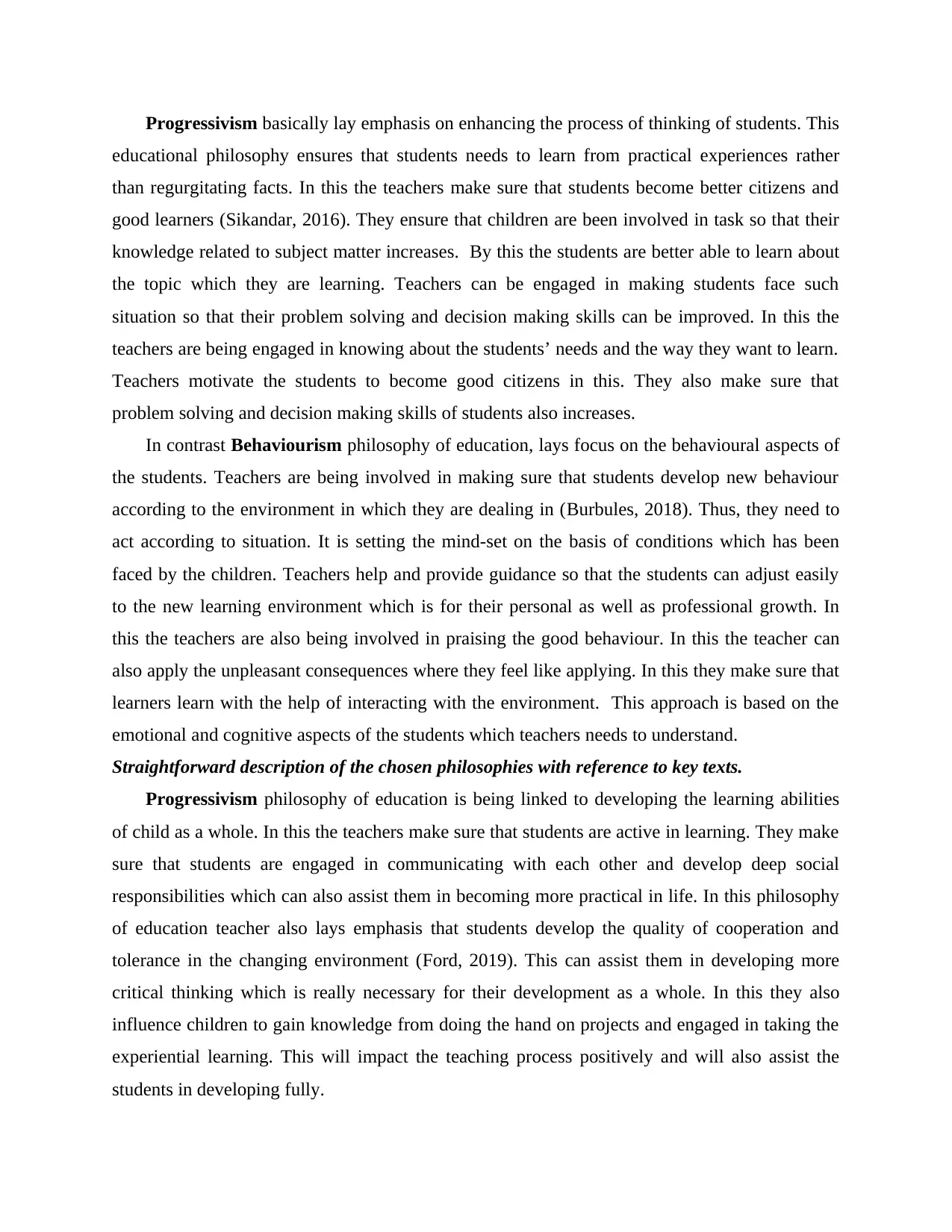
Progressivism basically lay emphasis on enhancing the process of thinking of students. This
educational philosophy ensures that students needs to learn from practical experiences rather
than regurgitating facts. In this the teachers make sure that students become better citizens and
good learners (Sikandar, 2016). They ensure that children are been involved in task so that their
knowledge related to subject matter increases. By this the students are better able to learn about
the topic which they are learning. Teachers can be engaged in making students face such
situation so that their problem solving and decision making skills can be improved. In this the
teachers are being engaged in knowing about the students’ needs and the way they want to learn.
Teachers motivate the students to become good citizens in this. They also make sure that
problem solving and decision making skills of students also increases.
In contrast Behaviourism philosophy of education, lays focus on the behavioural aspects of
the students. Teachers are being involved in making sure that students develop new behaviour
according to the environment in which they are dealing in (Burbules, 2018). Thus, they need to
act according to situation. It is setting the mind-set on the basis of conditions which has been
faced by the children. Teachers help and provide guidance so that the students can adjust easily
to the new learning environment which is for their personal as well as professional growth. In
this the teachers are also being involved in praising the good behaviour. In this the teacher can
also apply the unpleasant consequences where they feel like applying. In this they make sure that
learners learn with the help of interacting with the environment. This approach is based on the
emotional and cognitive aspects of the students which teachers needs to understand.
Straightforward description of the chosen philosophies with reference to key texts.
Progressivism philosophy of education is being linked to developing the learning abilities
of child as a whole. In this the teachers make sure that students are active in learning. They make
sure that students are engaged in communicating with each other and develop deep social
responsibilities which can also assist them in becoming more practical in life. In this philosophy
of education teacher also lays emphasis that students develop the quality of cooperation and
tolerance in the changing environment (Ford, 2019). This can assist them in developing more
critical thinking which is really necessary for their development as a whole. In this they also
influence children to gain knowledge from doing the hand on projects and engaged in taking the
experiential learning. This will impact the teaching process positively and will also assist the
students in developing fully.
educational philosophy ensures that students needs to learn from practical experiences rather
than regurgitating facts. In this the teachers make sure that students become better citizens and
good learners (Sikandar, 2016). They ensure that children are been involved in task so that their
knowledge related to subject matter increases. By this the students are better able to learn about
the topic which they are learning. Teachers can be engaged in making students face such
situation so that their problem solving and decision making skills can be improved. In this the
teachers are being engaged in knowing about the students’ needs and the way they want to learn.
Teachers motivate the students to become good citizens in this. They also make sure that
problem solving and decision making skills of students also increases.
In contrast Behaviourism philosophy of education, lays focus on the behavioural aspects of
the students. Teachers are being involved in making sure that students develop new behaviour
according to the environment in which they are dealing in (Burbules, 2018). Thus, they need to
act according to situation. It is setting the mind-set on the basis of conditions which has been
faced by the children. Teachers help and provide guidance so that the students can adjust easily
to the new learning environment which is for their personal as well as professional growth. In
this the teachers are also being involved in praising the good behaviour. In this the teacher can
also apply the unpleasant consequences where they feel like applying. In this they make sure that
learners learn with the help of interacting with the environment. This approach is based on the
emotional and cognitive aspects of the students which teachers needs to understand.
Straightforward description of the chosen philosophies with reference to key texts.
Progressivism philosophy of education is being linked to developing the learning abilities
of child as a whole. In this the teachers make sure that students are active in learning. They make
sure that students are engaged in communicating with each other and develop deep social
responsibilities which can also assist them in becoming more practical in life. In this philosophy
of education teacher also lays emphasis that students develop the quality of cooperation and
tolerance in the changing environment (Ford, 2019). This can assist them in developing more
critical thinking which is really necessary for their development as a whole. In this they also
influence children to gain knowledge from doing the hand on projects and engaged in taking the
experiential learning. This will impact the teaching process positively and will also assist the
students in developing fully.
⊘ This is a preview!⊘
Do you want full access?
Subscribe today to unlock all pages.

Trusted by 1+ million students worldwide
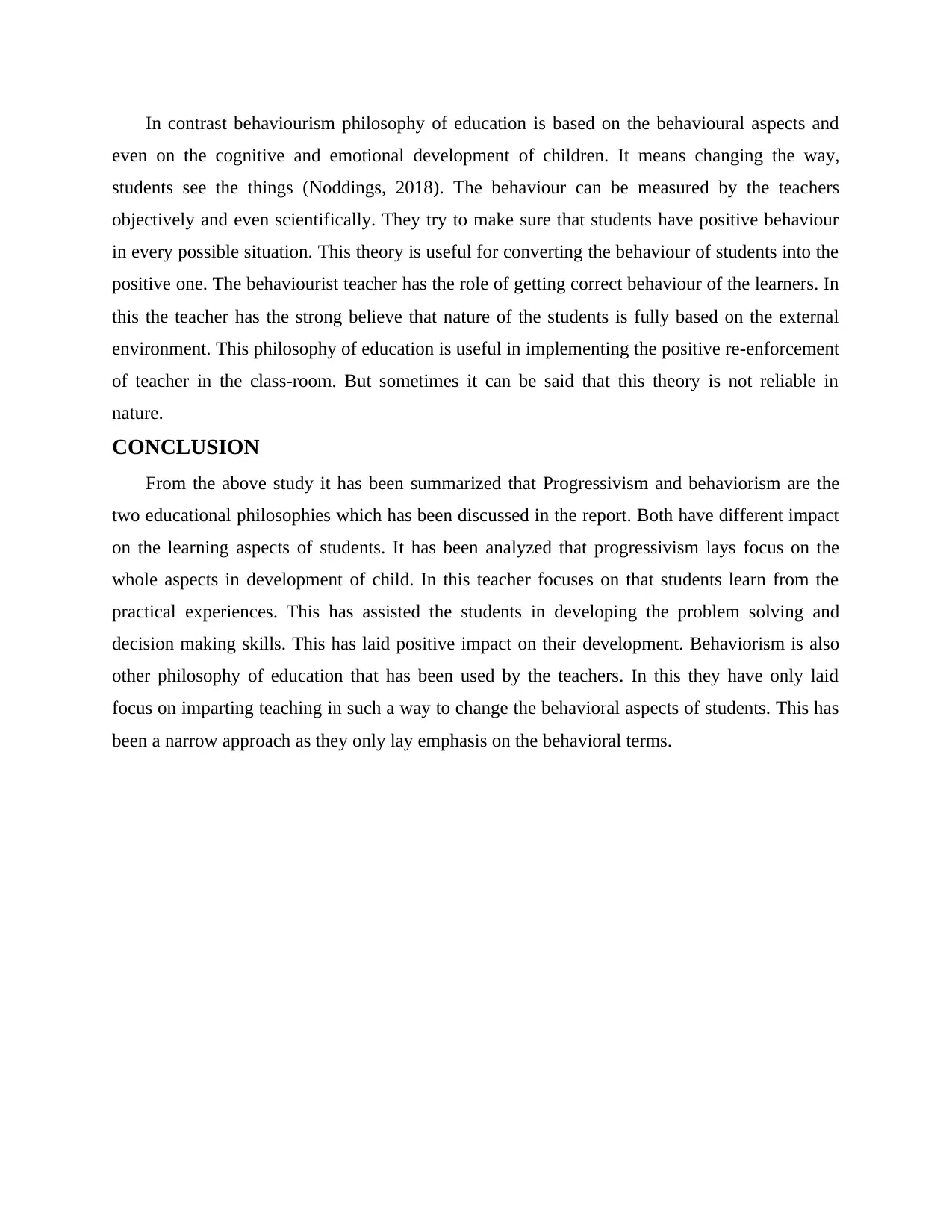
In contrast behaviourism philosophy of education is based on the behavioural aspects and
even on the cognitive and emotional development of children. It means changing the way,
students see the things (Noddings, 2018). The behaviour can be measured by the teachers
objectively and even scientifically. They try to make sure that students have positive behaviour
in every possible situation. This theory is useful for converting the behaviour of students into the
positive one. The behaviourist teacher has the role of getting correct behaviour of the learners. In
this the teacher has the strong believe that nature of the students is fully based on the external
environment. This philosophy of education is useful in implementing the positive re-enforcement
of teacher in the class-room. But sometimes it can be said that this theory is not reliable in
nature.
CONCLUSION
From the above study it has been summarized that Progressivism and behaviorism are the
two educational philosophies which has been discussed in the report. Both have different impact
on the learning aspects of students. It has been analyzed that progressivism lays focus on the
whole aspects in development of child. In this teacher focuses on that students learn from the
practical experiences. This has assisted the students in developing the problem solving and
decision making skills. This has laid positive impact on their development. Behaviorism is also
other philosophy of education that has been used by the teachers. In this they have only laid
focus on imparting teaching in such a way to change the behavioral aspects of students. This has
been a narrow approach as they only lay emphasis on the behavioral terms.
even on the cognitive and emotional development of children. It means changing the way,
students see the things (Noddings, 2018). The behaviour can be measured by the teachers
objectively and even scientifically. They try to make sure that students have positive behaviour
in every possible situation. This theory is useful for converting the behaviour of students into the
positive one. The behaviourist teacher has the role of getting correct behaviour of the learners. In
this the teacher has the strong believe that nature of the students is fully based on the external
environment. This philosophy of education is useful in implementing the positive re-enforcement
of teacher in the class-room. But sometimes it can be said that this theory is not reliable in
nature.
CONCLUSION
From the above study it has been summarized that Progressivism and behaviorism are the
two educational philosophies which has been discussed in the report. Both have different impact
on the learning aspects of students. It has been analyzed that progressivism lays focus on the
whole aspects in development of child. In this teacher focuses on that students learn from the
practical experiences. This has assisted the students in developing the problem solving and
decision making skills. This has laid positive impact on their development. Behaviorism is also
other philosophy of education that has been used by the teachers. In this they have only laid
focus on imparting teaching in such a way to change the behavioral aspects of students. This has
been a narrow approach as they only lay emphasis on the behavioral terms.
Paraphrase This Document
Need a fresh take? Get an instant paraphrase of this document with our AI Paraphraser
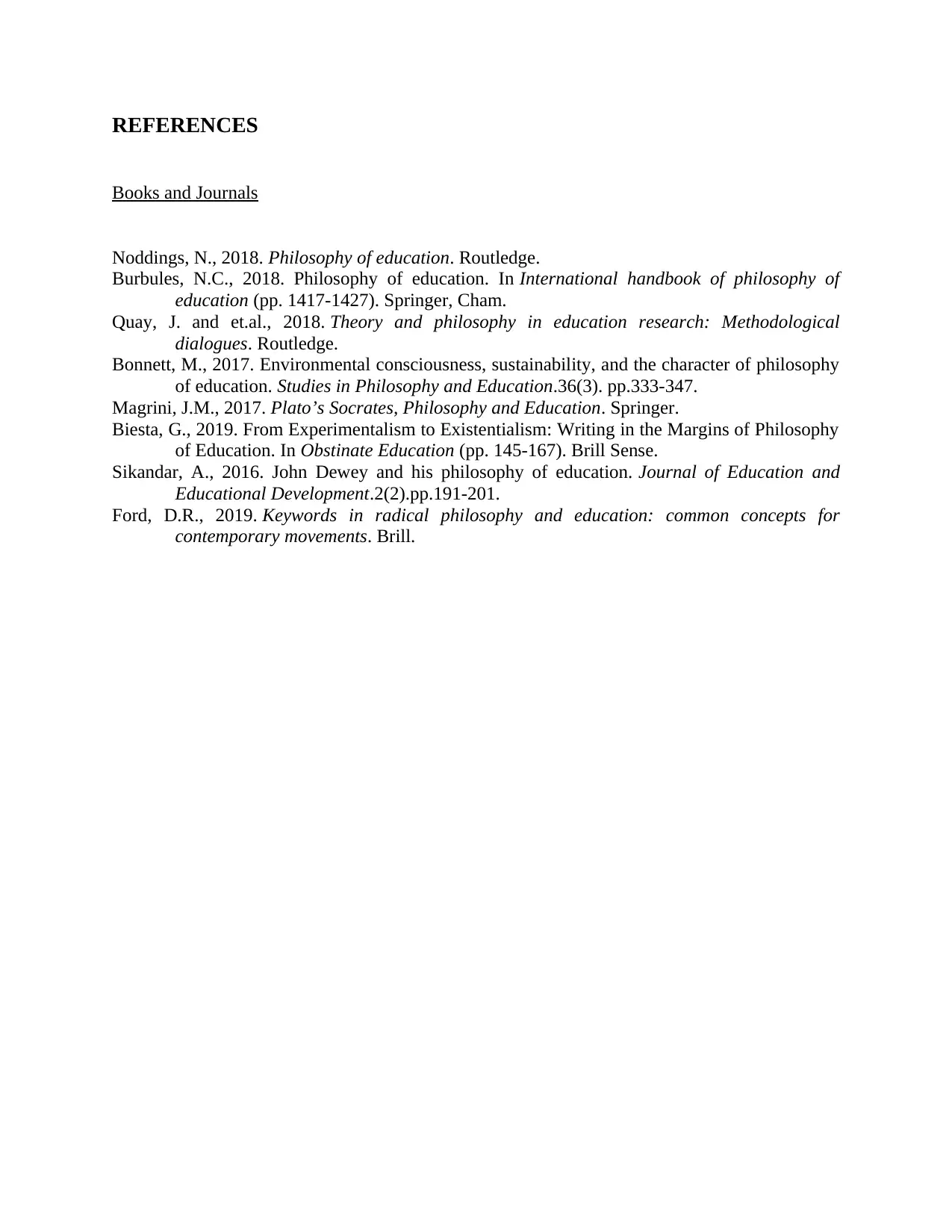
REFERENCES
Books and Journals
Noddings, N., 2018. Philosophy of education. Routledge.
Burbules, N.C., 2018. Philosophy of education. In International handbook of philosophy of
education (pp. 1417-1427). Springer, Cham.
Quay, J. and et.al., 2018. Theory and philosophy in education research: Methodological
dialogues. Routledge.
Bonnett, M., 2017. Environmental consciousness, sustainability, and the character of philosophy
of education. Studies in Philosophy and Education.36(3). pp.333-347.
Magrini, J.M., 2017. Plato’s Socrates, Philosophy and Education. Springer.
Biesta, G., 2019. From Experimentalism to Existentialism: Writing in the Margins of Philosophy
of Education. In Obstinate Education (pp. 145-167). Brill Sense.
Sikandar, A., 2016. John Dewey and his philosophy of education. Journal of Education and
Educational Development.2(2).pp.191-201.
Ford, D.R., 2019. Keywords in radical philosophy and education: common concepts for
contemporary movements. Brill.
Books and Journals
Noddings, N., 2018. Philosophy of education. Routledge.
Burbules, N.C., 2018. Philosophy of education. In International handbook of philosophy of
education (pp. 1417-1427). Springer, Cham.
Quay, J. and et.al., 2018. Theory and philosophy in education research: Methodological
dialogues. Routledge.
Bonnett, M., 2017. Environmental consciousness, sustainability, and the character of philosophy
of education. Studies in Philosophy and Education.36(3). pp.333-347.
Magrini, J.M., 2017. Plato’s Socrates, Philosophy and Education. Springer.
Biesta, G., 2019. From Experimentalism to Existentialism: Writing in the Margins of Philosophy
of Education. In Obstinate Education (pp. 145-167). Brill Sense.
Sikandar, A., 2016. John Dewey and his philosophy of education. Journal of Education and
Educational Development.2(2).pp.191-201.
Ford, D.R., 2019. Keywords in radical philosophy and education: common concepts for
contemporary movements. Brill.

1
⊘ This is a preview!⊘
Do you want full access?
Subscribe today to unlock all pages.

Trusted by 1+ million students worldwide
1 out of 9
Related Documents
Your All-in-One AI-Powered Toolkit for Academic Success.
+13062052269
info@desklib.com
Available 24*7 on WhatsApp / Email
![[object Object]](/_next/static/media/star-bottom.7253800d.svg)
Unlock your academic potential
Copyright © 2020–2026 A2Z Services. All Rights Reserved. Developed and managed by ZUCOL.





